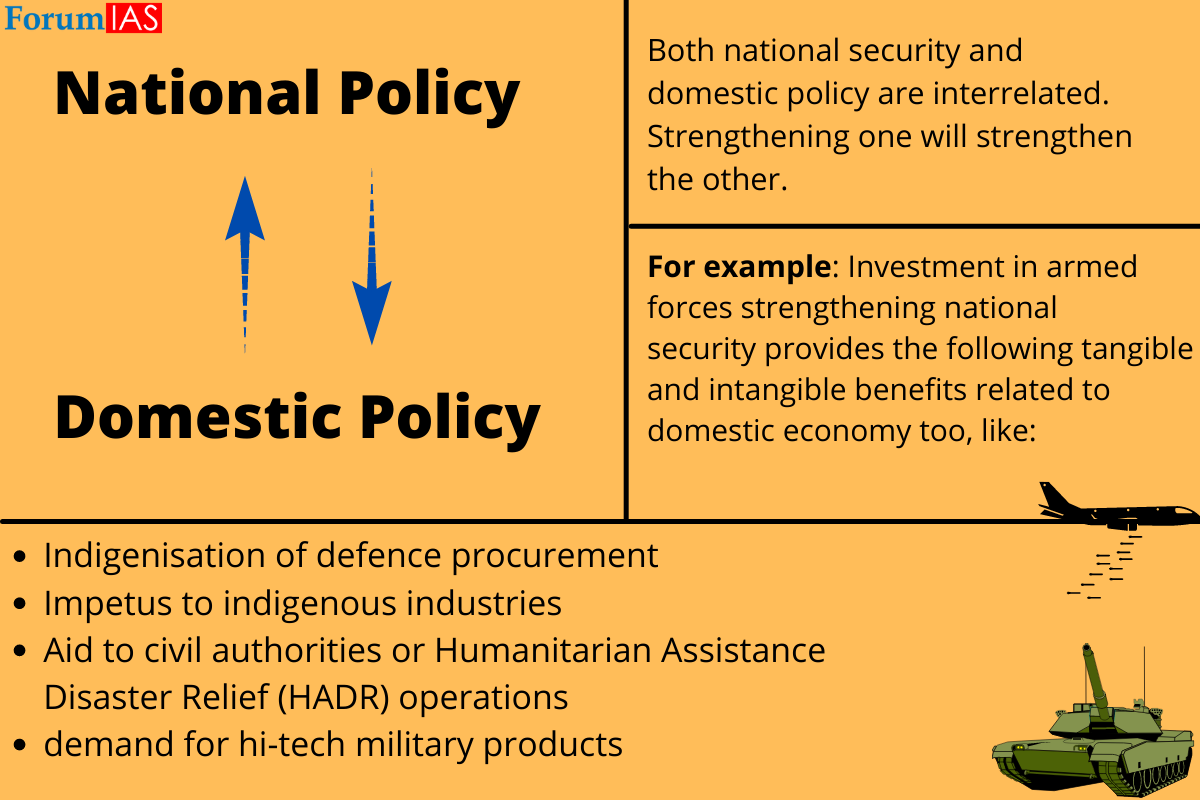ForumIAS announcing GS Foundation Program for UPSC CSE 2025-26 from 19 April. Click Here for more information.
ForumIAS Answer Writing Focus Group (AWFG) for Mains 2024 commencing from 24th June 2024. The Entrance Test for the program will be held on 28th April 2024 at 9 AM. To know more about the program visit: https://forumias.com/blog/awfg2024
Contents
Synopsis: National security has long been viewed through a narrow perspective of just war-fighting. In the present scenario being shaped up by multiple factors like climate change, a rising China and the COVID pandemic, national security and domestic policy are to be seen as two sides of the same coin. This new understanding is gaining ground.
Introduction
Aspects surrounding global and national security discourse are undergoing transformational change. The old order is collapsing much faster than the ability of nations to create the foundations of a new one.
The idea that foreign and domestic policy are two sides of the same coin is gaining prominence. Also, there’s a greater recognition of the challenges on national security originating from domestic vulnerabilities.
How India’s policy and view on national security is evolving?
Dependence on overseas supply chains is a national security challenge: COVID pandemic revealed how deeply India has been dependent on Chinese manufacturing for critical supplies. At a time when Indian armed forces were facing the People’s Liberation Army across the Line of Actual Line, this exposed India to a new realization that dependence on overseas supply chains is a national security challenge. India has since moved towards building up domestic capacities in critical areas and also started looking at free trade.
Views of the military leadership in India are also evolving. The national security comprises not only warfare and defence but also financial security, health security, food security, energy security and environment security apart from information security. Instead of viewing national security primarily from the perspective of an armed conflict, there is a need to take a whole-of-government approach towards security.
How US policy is evolving wrt its views on foreign policy and national security?
USA: For the US, its foreign policy is now integrated with its domestic policy. It is based around this simple question: Will it make life better, easier, safer, for working families across the USA?. Discourse around national security in the US is centered around the following factors:
Building up the domestic industrial base, maintaining pre-eminence in critical technologies, making supply chains for critical goods more resilient, protecting critical infrastructure from cyberattacks, and responding with a sense of urgency to climate change.
How Indian policymakers should strategize resource allocation post-COVID pandemic?
In the post-pandemic world with a serious strain on national resources, it will be important for policymakers
to underline areas of close cooperation between the civilian and the military spheres.
This idea is again based on the understanding that national security policy is invariably linked with domestic policy and vice-versa.
For example: Here are some tangible and intangible ways in which investment in the armed forces contributes to the national economy such as indigenisation of defence procurement, providing an impetus to indigenous industries, aid to civil authorities or Humanitarian Assistance and Disaster Relief (HADR) operations protecting infrastructure, demand for hi-tech military products by the armed forces spurring entire industries, and transportation and logistics capacities of the armed forces acting as force enablers for the Government in times of emergencies.
Source: This post is based on the article “The national security discourse is changing” published in The Hindu on 10th Sep 2021.





